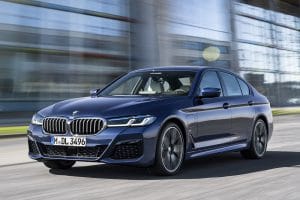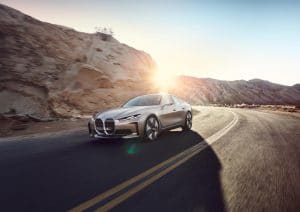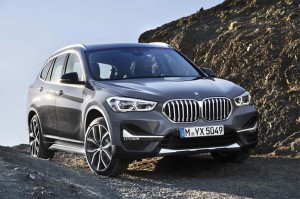BMW was an early entrant in the electrified vehicle market but products like the i3 and i8 have lost momentum as competitors such as Tesla roll out new models of their own. Now, BMW is pushing back with an ambitious sales target and a wave of new battery-electric vehicles meant to hit the bull’s-eye.
The automaker Monday revealed it will launch a fully electric version of one of its most important product lines, the 5 Series, as well as the X1 SUV Overall, the goal is to have 25 “electrified” models in production by 2023, half of them fully electric. The announcement came as BMW begins converting its Munich factory to handle production of its next fully electric model, the i4.
Currently, BMW is an also-ran in the battery-car market. But it now has ambitious sales goals, according to a statement outlining its new plans. “In ten years, the goal is to have a total of more than seven million electrified BMW Group vehicles on the roads – around two thirds of them with a fully-electric drive train,” it said.
(BMW, Mercedes suspend joint AV development deal.)
BMW has revised its electrification strategy several times in recent years. When it launched its sub-brand, BMW i, the approach was to come up with unique platforms and products that only would be electrified, whether as plug-in hybrids, like the i8 sports car, or in all-electric form, such as the i3 city car.
While there will still be dedicated electrified products, such as the upcoming iNEXT, the current approach focuses primarily on flexible platforms that can go anywhere from pure gas and electric to all-electric, with various hybrid options and even hydrogen. The X5 Sport-Activity Vehicle will be offered with a fuel-cell option in a limited selection of markets starting in 2022.
The timing of the all-electric 5 Series and X1 models has not yet been announced. But the rollout of new battery-electric cars and sport-utility vehicles will begin in the months ahead and accelerate rapidly through 2021 when the BMW Group will add five BEVs: the Cooper SE from Mini and, from BMW, the next-generation i3, the iX3, the iNEXT and the i4.
The i4 actually will be the first of that batch from the BMW brand and the automaker shut down its sprawling plant in Munich last week, temporarily idling its workforce of around 7,800, while it prepares for the new model. It aims to be back up and running on Sept. 3.
(BMW keeps on truckin’ with its 2021 5 Series sedan.)
“We are preparing our Munich plant for the future. Once the remodel is complete, we will be able to produce diesel, gasoline and hybrid vehicles, as well as the fully electric BMW i4, all on the same line, to respond flexibly to customer demand,” said factory chief Robert Engelhorn.
BMW’s electrification strategy has to take into account numerous variables. EV demand is still relatively modest worldwide, but is expected to grow substantially over the coming decade – though that will vary by country.
Europe has laid out aggressive targets for reducing carbon dioxide emissions, with hefty penalties for manufacturers that don’t comply, so it will see an aggressive push by BMW which wants to see fully a third of the vehicles it sells there using some form of electric drive by 2025. China, which is pushing “New Energy Vehicles” in a bid to address its endemic smog problems, will also be a primary target.
Overall, BMW said, it plans to reduce carbon dioxide output per vehicle 30% by the end of the decade.
“We will report on our progress every year and measure ourselves against these targets,” Chief Executive Officer Oliver Zipse said, adding that management will be held accountable, their pay “tangibly” impacted by its push to go green.
(BMW may go for a plug-in hybrid with upcoming X8 M.)
To back up its electrification push, the German automaker this month announced a deal with Swedish supplier Northvolt AB to purchase $2.3 billion worth of lithium-ion battery cells.



